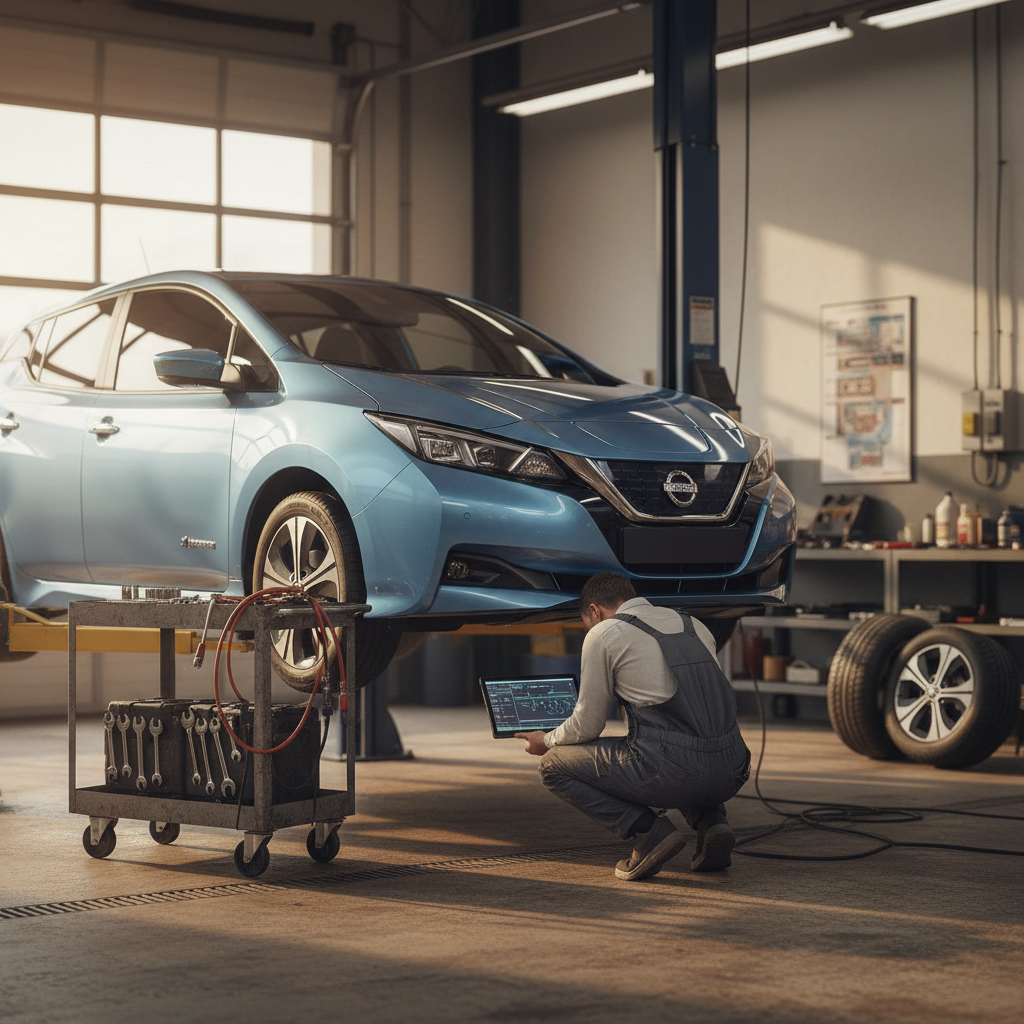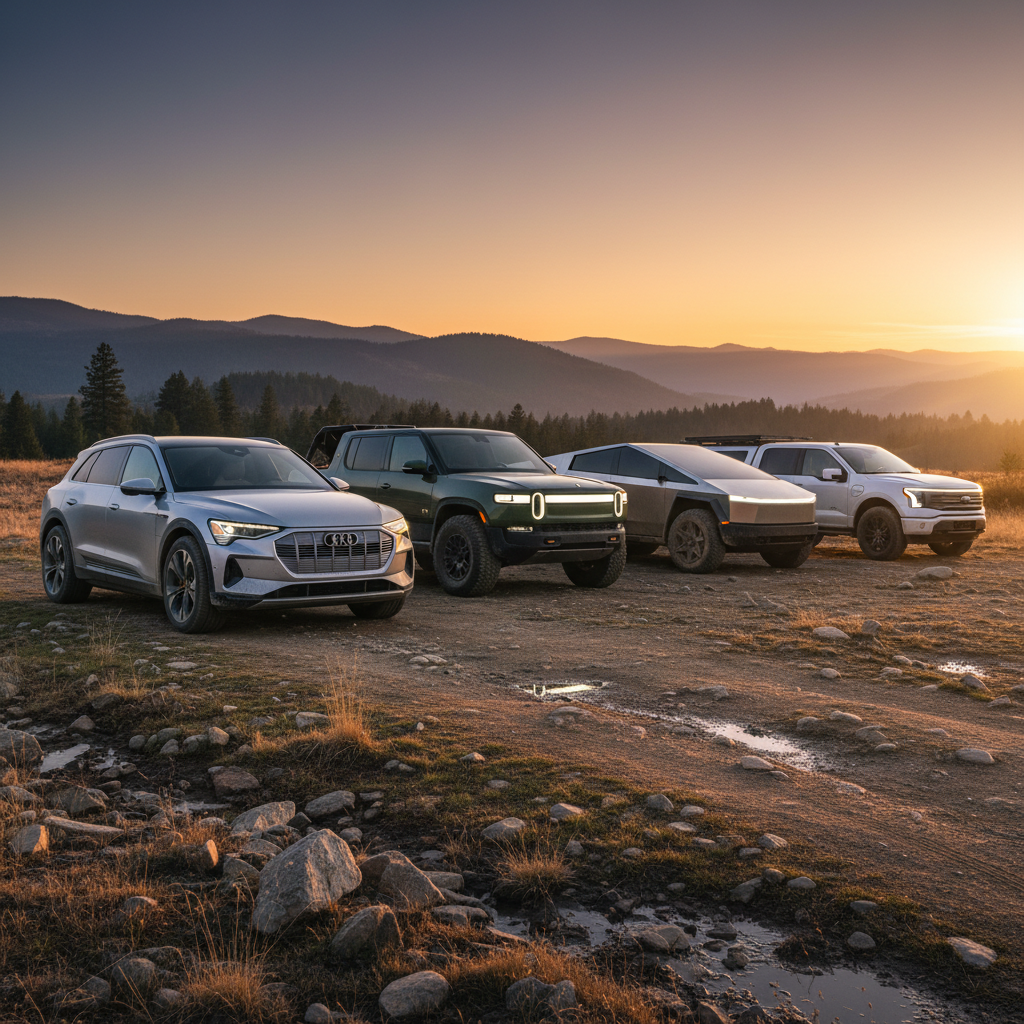If you’re trying to figure out the best electric pickup truck in 2025, you’re not alone. Between the Ford F‑150 Lightning, Chevy Silverado EV, GMC Sierra EV, Rivian R1T, Tesla Cybertruck and a growing cast of newcomers, it’s hard to see which truck actually fits your life, not just wins a spec‑sheet war.
Who this guide is for
How to choose the best electric pickup truck
Before we start crowning winners, it helps to define what “best” means for you. Electric pickups span everything from work‑focused Ford F‑150 Lightning trims to luxury rigs like the GMC Sierra EV Denali. The right truck depends on how you’ll actually use it: daily commuting, home‑improvement runs, towing heavy trailers, or overlanding on the weekends.
Four factors that really matter with electric pickups
Focus on these instead of just chasing the biggest battery or most horsepower.
Real range
Towing & payload
Charging practicality
Total cost
Pro tip
Quick ranking: best electric trucks for 2025
Editor’s picks: best electric pickup trucks 2025
Headline comparison: 2025 electric pickup truck lineup
Approximate specs for key 2025 electric pickups. Always confirm exact figures for the trim you’re considering, as ranges and capacities vary widely by battery, motor and wheel choices.
| Model | Approx. Range (max trim) | Max Towing | Starting Price (new, approx.) | Best For |
|---|---|---|---|---|
| Rivian R1T | ~350+ miles (dual‑motor Large pack) | Up to ~11,000 lbs | Mid $70Ks+ | Adventure + everyday use |
| Ford F‑150 Lightning | Up to ~320 miles (extended‑range battery) | Up to ~10,000 lbs | Low $60Ks+ | Work use + familiar F‑150 feel |
| Chevy Silverado EV | Up to ~492 miles (WT Max Range) | Up to ~12,500 lbs (select trims) | High $50Ks+ (WT), $70Ks+ (LT) | Range + bed utility |
| GMC Sierra EV | Up to ~460 miles (Denali Max Range) | Around 10,500 lbs | Around $90K+ | Luxury truck buyers |
| Tesla Cybertruck | Roughly 320–350 miles (dual/tri‑motor) | Around 11,000 lbs | High $70Ks+ | Bold styling, Tesla ecosystem |
Specs are approximate and can change by trim, wheel choice, temperature and load. Use them as directional guides, not guarantees.
Spec sheet reality check
Range and charging: which electric truck goes farthest?
Range is where electric pickups have made huge strides since the first F‑150 Lightnings and R1Ts hit the road. Today, trucks like the Silverado EV WT Max Range and GMC Sierra EV Denali Max Range can crest the 450–490‑mile mark on paper, while most dual‑motor trims from Rivian and Tesla sit in the 300–350‑mile neighborhood. The right number for you depends on how much highway driving and towing you actually do.

Maximum range champs
- Chevy Silverado EV WT Max Range – EPA-estimated range near the 490‑mile mark in 2025 WT Max Range form.
- GMC Sierra EV Denali Max Range – around 460 miles of rated range, with big‑battery Ultium tech and dual motors.
- Rivian R1T Dual‑Motor Large Pack – mid‑300‑mile figures with off‑road‑ready hardware.
If you constantly run long highway routes, these high‑range trims reduce how often you need to stop, though they also cost more up front.
Everyday range sweet spot
- Ford F‑150 Lightning Extended Range – up to about 320 miles when not towing, with familiar F‑Series ergonomics.
- Standard‑range Silverado and Sierra EV trims – 280–420 miles depending on battery and spec.
- Tesla Cybertruck – roughly 320–350 miles in most two‑ and three‑motor versions after its range‑extender plans were shelved.
For many owners who mostly commute, run errands and tow occasionally, this 280–330‑mile band offers a good balance of price and practicality.
Home charging matters more than peak range
Charging speed: who gets back on the road fastest?
DC fast‑charging times are crucial if you road‑trip or tow.
Silverado EV / Sierra EV
Rivian R1T
F‑150 Lightning & Cybertruck
Towing, hauling, and real work capability
Electric pickups deliver instant torque, which is terrific for towing and hauling. But that same physics, high weight, big frontal area, also means towing slashes range. The key is to think about how far you actually tow, not how often you talk about it.

How the main electric pickups stack up for work
Approximate maximum towing and where each truck shines.
Ford F‑150 Lightning
- Max towing: up to around 10,000 lbs with the right package.
- Why it works: Familiar F‑150 cabin, strong aftermarket, easy transition for fleets and contractors.
- Watch for: Range drops quickly with a big trailer; plan on conservative speeds and more frequent charging stops.
Rivian R1T & GM Ultium trucks
- Rivian R1T: stout towing (around 11,000 lbs) and great stability control; popular with outdoor and overlanding buyers.
- Silverado EV / Sierra EV: towing capacities landing in the 10,000–12,500‑lb range on the right trims, with clever features like midgates and air suspension.
- Cybertruck: rated around 11,000 lbs, but range and charging access should be your focus if you tow frequently.
Critical towing reality
Value and total cost of ownership
Sticker prices for new electric pickups are still high, often starting in the $60,000–$90,000 range, but that doesn’t tell the whole story. Electricity is typically cheaper per mile than gasoline, maintenance is lower, and used values are starting to normalize as more trucks hit the secondary market.
Why an electric pickup can pencil out over time
Where Recharged fits in
Best electric pickup truck for your use case
No single truck tops every chart. Instead, think in terms of “best for me.” Here’s how the current lineup shakes out for different kinds of owners.
Match the truck to the job
Daily driver + weekend projects
You mainly commute, haul home‑improvement supplies, and occasionally tow a small trailer. A <strong>Ford F‑150 Lightning</strong> with an extended‑range battery or a more affordable <strong>Silverado EV or Sierra EV</strong> trim will feel familiar and comfortable, with plenty of capability and range.
Adventure and overlanding
You camp, trail ride, and value off‑road finesse. The <strong>Rivian R1T</strong> is still the standout here thanks to its size, suspension tuning, and off‑road‑ready tech. It’s also one of the more maneuverable trucks in tight spaces.
Maximum highway range
You run long interstate routes and want the fewest possible charging stops. Look hard at <strong>Silverado EV WT Max Range</strong> or <strong>GMC Sierra EV Denali Max Range</strong> trims, which push range figures well beyond most rivals, if your budget allows.
Luxury and tech showcase
You want the fanciest cabin and wow‑factor features. The <strong>GMC Sierra EV Denali</strong> and some high‑spec <strong>Rivian R1T</strong> builds deliver big‑screen interiors, premium materials, and attention‑getting details.
Design statement + Tesla ecosystem
If the look is part of the appeal and you already own Tesla products, the <strong>Cybertruck</strong> pairs unique styling with access to Tesla’s Supercharger network, though specs haven’t matched the earliest promises and pricing remains steep.
Best value on the used market
You want to let the first owner absorb the biggest depreciation hit. Early <strong>F‑150 Lightning</strong> and <strong>Rivian R1T</strong> builds are increasingly available used, often at far friendlier prices than new trucks with similar capability.
Buying a used electric pickup truck
Because new electric pickups are expensive, the used market is where many shoppers can finally make the numbers work. But with any EV, especially an early‑generation truck, you need to go deeper than mileage and paint condition.
What to check on a used EV truck
- Battery health: Ask for a report showing remaining capacity and any history of rapid degradation. This is central to the truck’s value.
- DC fast‑charging history: Occasional fast charging is fine; heavy, constant use may accelerate wear in some packs.
- Software status: Make sure over‑the‑air updates are current, especially on trucks like Rivian and Tesla that rely heavily on software.
- Recall and service history: Many early electric pickups have had recalls and updates, confirm that they’ve been completed.
Why a structured marketplace helps
Traditional used‑car lots often aren’t set up to evaluate battery health or explain charging in detail. A marketplace that specializes in EVs, like Recharged, can:
- Provide a Recharged Score Report with verified diagnostics.
- Benchmark pricing against the broader EV market, not just local auctions.
- Offer EV‑savvy advisors who can walk you through home charging, road‑trip planning, and tax incentive changes.
Battery health is the new “engine condition”
Checklist: key questions to ask before you buy
Pre‑purchase checklist for electric pickup shoppers
1. How will I really use this truck?
Write down a typical week: commute distance, hauling needs, towing frequency and longest road trips. Choose range and towing capacity that match your real world, not hypothetical cross‑country towing marathons.
2. Can I install Level 2 home charging?
If you own your home, talk to an electrician about a 240‑volt circuit in the driveway or garage. If you rent, ask about existing EV‑ready parking or whether portable Level 2 charging will work in your situation.
3. What range do I need in winter and while towing?
Assume your effective range could drop 30–50% in cold weather or when towing a heavy trailer at highway speeds. Start from that reduced number when planning trips.
4. What’s the battery warranty situation?
On a new truck, confirm years and mileage for battery coverage. On a used one, verify how much warranty remains and whether it’s transferable to you.
5. How does this truck fit my budget over 5–7 years?
Look beyond the payment: electricity vs. fuel cost, expected miles per year, insurance, and likely resale value. Recharged’s pricing tools and finance options can help you run the numbers more clearly.
6. Who’s going to support me after the sale?
Electric trucks are still new territory for many local shops. Make sure you’ll have access to brand‑certified service, and consider buying from an EV‑focused retailer who can answer questions as you live with the truck.
FAQ: best electric pickup trucks
Frequently asked questions about electric pickup trucks
Bottom line: how to shop smarter for an electric truck
The “best electric pickup truck” in 2025 isn’t a single model; it’s the one that fits your range needs, towing habits and budget without forcing you to compromise on how you actually live. Rivian’s R1T may be the most complete all‑rounder, while F‑150 Lightning, Silverado EV and Sierra EV cover traditional truck buyers, and the Cybertruck appeals to those who want something unapologetically different.
If you’re leaning toward a new truck, spend time test‑driving with your real use case in mind, bring the family, load the bed, and, if possible, try it with a trailer. If a used electric pickup makes more sense, look for transparent battery‑health data and clear pricing benchmarks. That’s exactly where Recharged comes in, combining verified battery diagnostics, fair‑market pricing, EV‑savvy guidance, and convenient delivery so you can get the right truck the first time.



